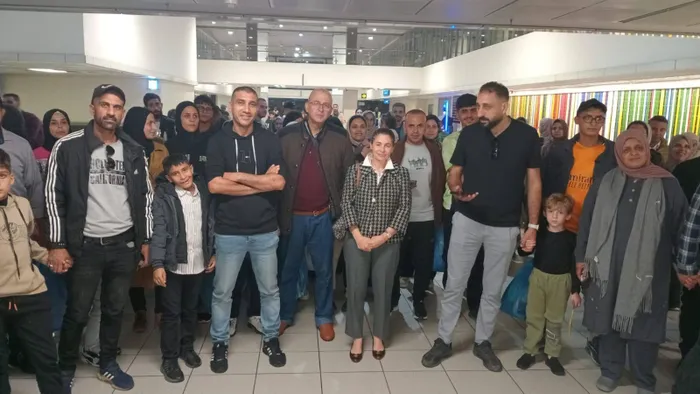Humanitarian efforts shine as South Africa assists Palestinian refugees

Flack Partners responds to claims surrounding the arrival of Palestinian refugees in South Africa, highlighting the complexities of their entry process and the misinformation circulating on social media.IN Picture: Palestinian refugees on arrival at OR Tambo International Airport this week.
Image: Facebook/Embassy of the State of Palestine / South Africa
While uncertainty continued to swirl over the circumstances that led to the arrival of the 153 Palestinian refugees in South Africa last week, various organisations commended the government for its "decisive action".
The Cape Town Ulama Board (CTUB) was one such body that appreciated the country's stance and labelled the humanitarian efforts amidst all the complexities a shining example of Ubuntu in action.
The Palestinian refugees, who arrived at the OR Tambo International Airport in Gauteng on Thursday, reportedly paid US$2,000 (R35 000) each for the promise of safe transport and settlement in a host country, only to realise that their journey was fraught with uncertainty.
Among the 153 refugees, who were stripped of their possessions, were a pregnant woman and children
The CTUB’s secretary general, Shaykh Sayed Ridhwaan, condemned those who were responsible for the initial inhumane conditions that the stranded Palestinians were subjected to.
“We are appalled by reports that these passengers were denied basic necessities such as food and water while confined to the aircraft, and that foreign authorities deliberately withheld necessary exit documentation,” Ridhwaan said.
Echoing CTUB's sentiments was Abdool Valodia, president of United for Palestine, who praised the South African government's compassionate handling of the situation.
He expressed gratitude to the Minister of International Relations and Cooperation for their decisive action in granting entry visas to these distressed citizens.
"This humanitarian gesture, despite their arrival without prior coordination, is a powerful testament to South Africa's solidarity with the Palestinian people," Valodia stated.
However, he also issued a warning to those misleading Palestinian citizens, highlighting the exploitation of their plight for political and financial gain.
"The actions of these entities amount to human trafficking and must be condemned.
"Compliance with forced displacement schemes is a crime under international law, and we support legal action against those responsible," Valodia concluded.
In an effort to set the record straight, Home Affairs Minister Dr Leon Schreiber stated that the 153 travellers were facilitated through the relevant immigration processes by officials from the Border Management Authority (BMA) upon arrival.
Schreiber noted that during the process, BMA officials observed the absence of departure stamps in some of the travellers' passports, as well as the fact that several travellers did not appear to have return tickets or addresses for their accommodation in South Africa.
"Importantly, as with many other countries, holders of ordinary Palestinian passports enjoy 90-day visa-exempt access to South Africa, subject to security and verification procedures to protect travellers.
"As a result of the identified discrepancies in this case, the BMA could not allow them entry immediately, as further verifications had to be undertaken," he said in a statement.
The Government of South Africa subsequently interacted with the Palestinian embassy and other stakeholders.
It was established that the absence of stamps, return tickets, and accommodation addresses did not necessarily indicate that the travellers wished to apply for asylum.
At the same time, the Embassy of the State of Palestine in South Africa confirmed its collaboration with South African authorities to resolve the humanitarian situation involving the 153 Palestinian citizens from Gaza.
The Embassy condemned the actions of unregistered organisations that exploited the dire conditions in Gaza, deceiving families and facilitating their travel irresponsibly.
Na'eem Jeenah, an activist and community leader who has been in contact with the Palestinians since their arrival in Johannesburg, said the group was not together and were being accommodated in different places across Johannesburg.
"Some are with South African families, others in hotels, and others are living in houses and flats provided to them by compassionate South Africans," he said.
However, the Public Relations company Flack Partners PR characterised last week's scene at OR Tambo International Airport as a campaign to blow the story out of proportion and make it seem more significant than it was.
The company’s representative, Tim Flack, stated that this is the second plane that has landed in South Africa under these circumstances, and the first plane did not encounter any issues with entry into the country.
Flack asserted that the blame should be placed squarely on South Africa, as it is widely known that the Israeli government has not stamped anyone leaving their country through an airport since 2013.
This situation arises as investigations continue into how more than three hundred Palestinian refugees ended up arriving in South Africa.
There have been claims that the Israeli government was behind this, in a bid to create a diplomatic nightmare for Pretoria.
However, Flack rebuffed these claims, stating that "the whole thing is misinformation." He warned that certain narratives get pushed, and people use social media to make things go viral, which then becomes the standard, and people do not bother to check the facts.
At the same time, the South African Zionist Federation categorically rejected claims that Israel “deliberately” withheld passport stamps to sabotage the refugees.
“This toxic narrative did not appear spontaneously; it was ignited by one man. His reckless allegation ignited the blaze of misinformation now dominating public debate.
"This is not mere error; it is a calculated distortion, weaponised to inflame outrage over facts. Israel abolished physical passport stamps for all foreign visitors on 15 January 2013, replacing them with a standard electronic entry or exit slip, the B/2 form,” the organisation said in its statement.
Chrispin Phiri, spokesperson for the Department of International Relations and Cooperation (DIRCO), did not provide any further details on the matter and said they stood by the Department of Home Affairs stance.
DAILY NEWS